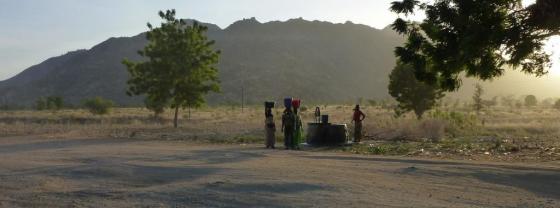Welcome to the SSWM Specific Topic Entry Page "SSWM in Africa" (STEP Africa)!
Completion on-going! Many factsheets, key resources etc. have been added recently. Check back regularly and send us your feedback.
Latest update: 04.12.2012
This is a Specific Topic Entry Page (STEP) to the SSWM Toolbox developed by the SSWM team in collaboration with Sub-Saharan African partners Water and Sanitation Association of Zambia (WASAZA) and Capacity Building for Integrated Water Resources Management (Cap-Net), and with the financial contribution of the Deutsche Gesellschaft für internationale Zusammenarbeit (GIZ) GmbH.

Women carrying water vessels in Cameroon. Source: D. SPUHLER (2011)
Read more:
About the STEP Africa
Partners of the STEP Africa
Content overview of the STEP Africa
Read more about the STEPs
Read more about the SSWM Toolbox
Sanitation and Hygiene in Africa: Where do we Stand?
This book takes stock of progress made by African countries through the AfricaSan process since 2008 and the progress needed to meet the MDG on sanitation by 2015 and beyond. It addresses priorities which have been identified by African countries as the key elements which need to be addressed in order to accelerate progress.This book is essential reading for government staff from Ministries responsible for sanitation, sector stakeholders working in NGOs, CSOs and agencies with a focus on sanitation and hygiene and water and Sanitation specialists. It is also suitable for Masters courses in water and sanitation and for researchers and the donor community.
CROSS, P. COOMBES, Y. (2013): Sanitation and Hygiene in Africa: Where do we Stand?. Analysis from the AfricaSan Conference, Kigali, Rwanda. London: International Water Association (IWA) Publishing URL [Accessed: 01.11.2013]Freshwater Conservation and Water, Sanitation, and Hygiene
The purpose of this document is to provide guidance to health, development, and conservation professionals in sub-Saharan Africa on how to plan, coordinate, develop, and achieve mutually supported WASH and freshwater conservation outcomes. It was designed to provide an overall framework to consider when working across sectors.
USAID (2013): Freshwater Conservation and Water, Sanitation, and Hygiene. Integration Guidelines - A Framework for Implementation in Sub-Saharan Africa. Washington: United States Agency for International Development (USAID) URL [Accessed: 11.01.2014]The ROSA Project
The ROSA project stands for Resource-Oriented Sanitation concepts for peri-urban areas in Africa. This Sustainable Sanitation Practice (SSP) issue contains the following contributions: 1. Introduction to the ROSA Project, 2. From Pilot Units to Large-Scale Implementation - Ethiopia, 3. Implementation of UDDTs at Schools - Kenya, 4. Urban Agriculture for Sanitation Promotion, 5. Operation an Maintenance in Practice, 6. Experiences from Strategic Sanitation Planning, 7. Main Findings and Main Achievements.
MUELLEGGER, E. ; LANGEGRABER, G. ; LECHNER, M. (2010): The ROSA Project. (= Sustainable Sanitation Practice , 4 ). Vienna: Ecosan Club URL [Accessed: 01.07.2013]Devolution in Kenya
Devolution, or the delegation of power by central government to local or regional administration, is by far the most significant initiative in governance that Kenya has undertaken since independence. Effective implementation of the new devolved framework now requires the water sector to focus on the emerging opportunities and to address a number of challenges. This note analyses the pertinent issues and options for national government and county leadership to achieve sustainable delivery of improved water services under the new dispensation.
WSP (2013): Devolution in Kenya. Opportunities and Challenges for the Water Sector. Washington: The World Bank, Water and Sanitation Program (WSP) URL [Accessed: 10.04.2019]
